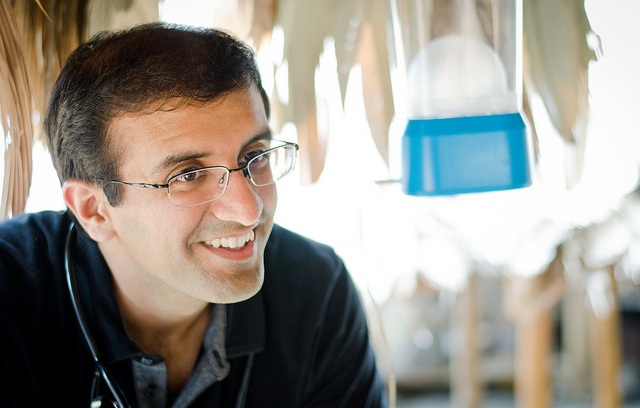
Dr. Raj Panjabi is not your ordinary doctor. He’s a Harvard Medical School instructor, a doctor at Brigham and Women’s Hospital, a TIME 100 Most Influential People honoree for his work on Ebola in rural Liberia, and now, he’s the 2017 winner of the coveted TED Prize.
Every year since 2005, the nonprofit TED has issued an annual prize, providing honorees with $1 million to accomplish their “wish”—a powerful, world-changing idea of their choosing. Previous honorees include Bono and chef Jamie Oliver. Panjabi says he will work on refining his wish with the TED team, and will announce his vision at the 2017 TED Conference in April.
At the age of 9, Panjabi, fled civil war in his home country of Liberia to the United States. He returned to Liberia in 2005 nearly two decades later as a doctor, and used funds he received as a wedding gift to launch Last Mile Health, an organization that trains and equips people to become health care workers and provide for their communities in Liberia. When Panjabi arrived in Liberia in 2005, there were only 51 doctors to serve nearly its 4 million people. For perspective, that’s as if the entire city of Washington, DC, had only 8 doctors.
“People were dying from conditions that they shouldn’t in the 21st century, like pneumonia and childbirth,” says Panjabi in an interview with TIME. “They would die anonymously.”
Today, thanks in large part to his work, the country has hundreds of health workers and is on it’s way to training and employing over 4,000.
The award is granted each year to an exceptional person with the means to tackle a global problem.
“I feel shocked and humbled,” says Panjabi, whose ultimate goal is to provide medical care to “everyone, everywhere, every day.”
“We look for an individual and issue that in our opinion will experience a tipping moment in the year ahead,” says TED Prize director Anna Verghese. “Raj is incredibly wise and compassionate, and he’s created something really successful. He’s dignifying the role of the community health worker, and the prize will really accelerate the progress.”
Health care workers trained and supported by Last Mile Health were critical in helping snuff out the devastating Ebola outbreak that began in 2014. The organization trained 1,300 community health workers who offered care and logistics during the outbreak, particularly in reaching people outside of city centers which weren’t easily reached by already scant resources.
Now, the group is working with the Liberia Ministry of Health to launch a National Community Health Assistance Program that will train and employ more than 4,000 community health workers throughout the country. In 2016, Last Mile Health’s community health workers conducted over 42,000 patient visits, including treatment of 22,000 cases of malaria, pneumonia, and diarrhea in children.
A 2015 report by Last Mile Health, the World Bank and others shows that every dollar invested in community health workers in sub-Saharan Africa results in an economic return of $10. More health care workers means fewer people have untreated infectious diseases, for instance, and they miss fewer days of work. Of course, sub-Saharan Africa isn’t the only place that can benefit.
“Coming after the election it’s clear that rural America has an economic crisis and a health care crisis,” says Panjabi, adding that thousands of jobs could be created if a similar initiative was put into place stateside.
“Being a physician taught me that we are not defined by the crises in our lives,” says Panjabi. “We are defined by how we respond.” Currently, 1 billion people worldwide live without access to health care because they live too far away from clinics and physicians—a gap Last Mile Health endeavors to narrow.
“There is so much to be done,” says Panjabi. “The healthier we keep our communities, the more productive they will be. Morally, it’s the right thing to do.”
More Must-Reads from TIME
- Cybersecurity Experts Are Sounding the Alarm on DOGE
- Meet the 2025 Women of the Year
- The Harsh Truth About Disability Inclusion
- Why Do More Young Adults Have Cancer?
- Colman Domingo Leads With Radical Love
- How to Get Better at Doing Things Alone
- Michelle Zauner Stares Down the Darkness
Contact us at letters@time.com